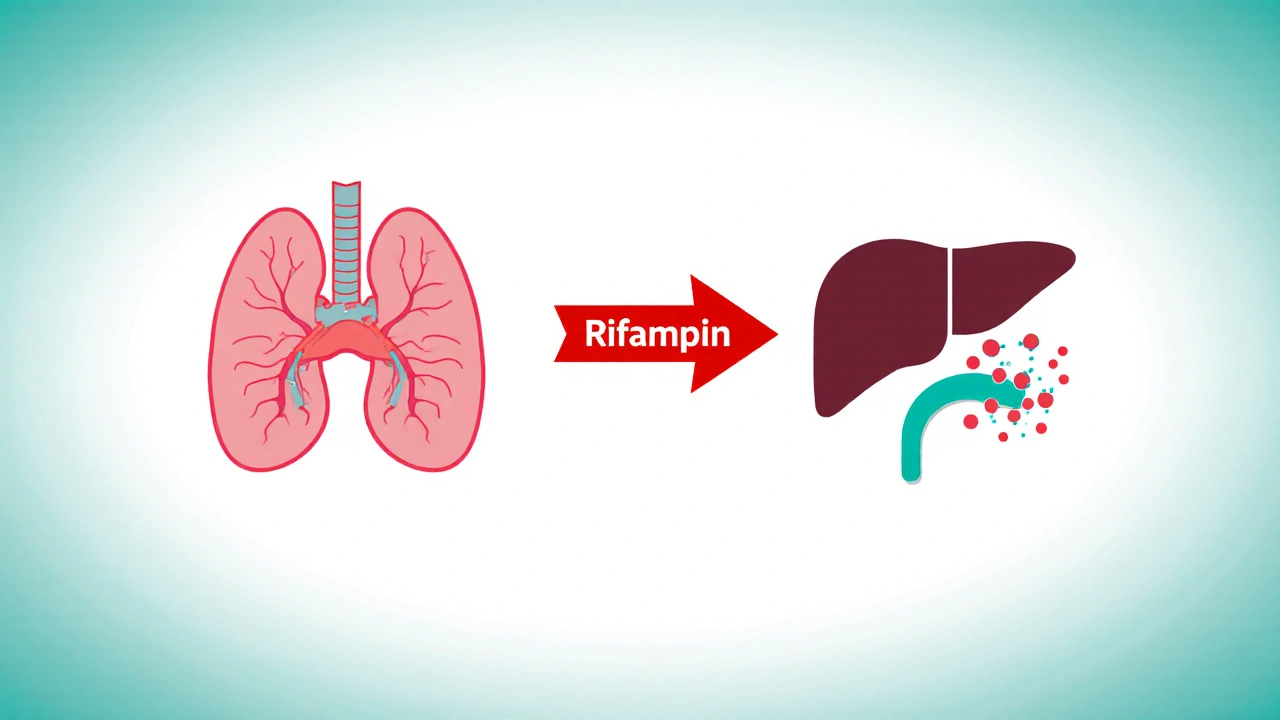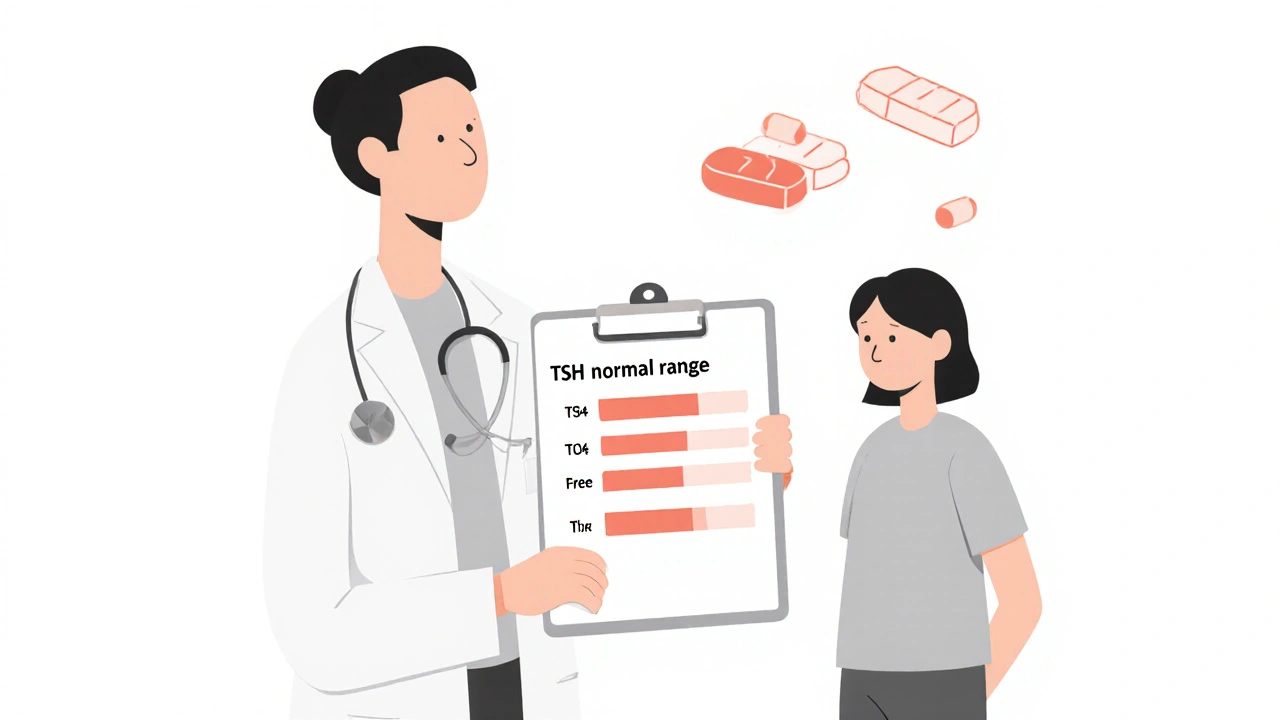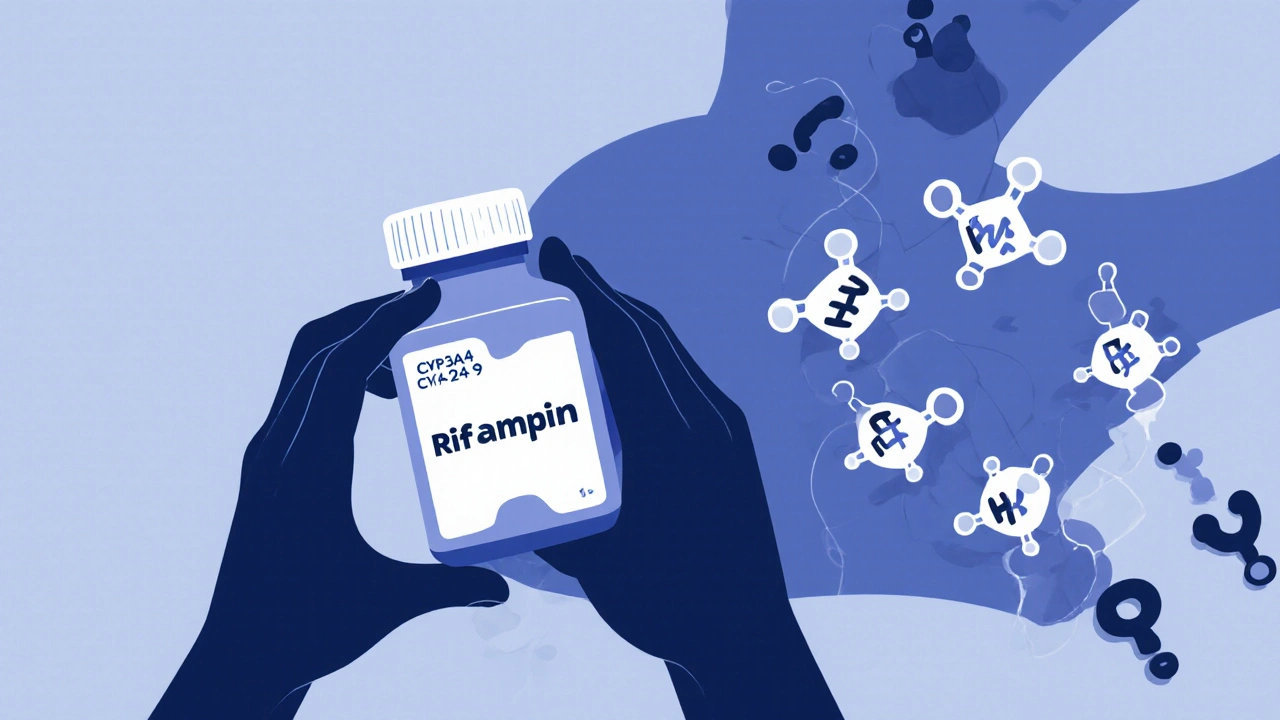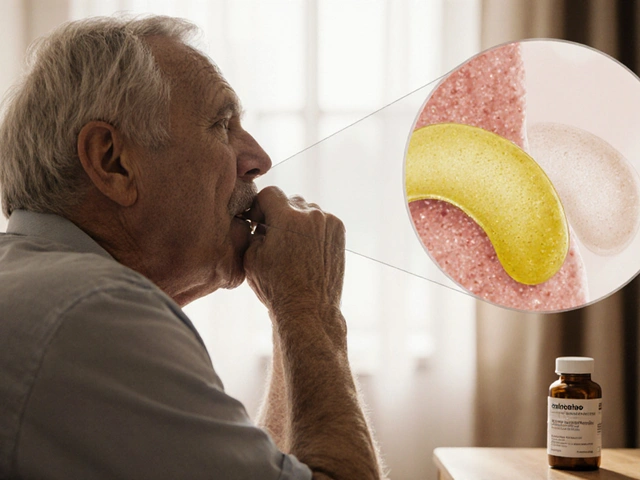Many people taking rifampin for tuberculosis or other infections don’t realize it can quietly mess with their thyroid. It’s not a common side effect like nausea or orange urine - but if you’re already dealing with thyroid issues, or you start feeling unusually tired, cold, or sluggish while on rifampin, it might not be just fatigue. Rifampin can lower your thyroid hormone levels, and that’s something your doctor should be watching for.
How Rifampin Affects Thyroid Hormones
Rifampin is a powerful antibiotic that speeds up how fast your liver breaks down drugs. It activates enzymes called cytochrome P450, especially CYP3A4 and CYP2C9. These enzymes don’t just process antibiotics - they also handle thyroid hormones like T4 (thyroxine) and T3 (triiodothyronine). When rifampin turns up the heat on these enzymes, your body clears thyroid hormones faster than normal.
Studies show that people on rifampin can see their free T4 levels drop by 20-40% within just a few weeks. Total T4 and T3 levels fall too. But here’s the catch: TSH (thyroid-stimulating hormone) often stays normal. That’s why many people don’t realize anything’s wrong. Standard thyroid tests might look fine, but your body is running on less hormone than it needs.
Who’s at Risk?
Not everyone on rifampin will have thyroid problems - but some groups are more vulnerable.
- People with pre-existing hypothyroidism who take levothyroxine
- Those with borderline thyroid function or subclinical hypothyroidism
- Patients on long-term rifampin therapy (like for TB or staph infections)
- Older adults and people with low thyroid reserve
For someone already taking levothyroxine, rifampin can cut the drug’s effectiveness in half. A 2023 study in Thyroid journal found that 68% of hypothyroid patients on levothyroxine needed a 30-50% dose increase within 2-4 weeks of starting rifampin. Without adjustment, they’d develop symptoms like weight gain, brain fog, and heart palpitations - even though their TSH looked normal on paper.
What Symptoms Might You Notice?
If rifampin is affecting your thyroid, you might feel like you’re just getting older, stressed, or out of shape. But these signs are classic signs of low thyroid hormone:
- Unexplained fatigue, even after enough sleep
- Feeling cold when others are comfortable
- Weight gain without changes in diet or exercise
- Constipation
- Dry skin or hair loss
- Depressed mood or difficulty concentrating
- Slowed heart rate
These symptoms don’t show up overnight. They creep in over weeks. If you’re on rifampin for TB treatment and start feeling worse after the first month, don’t brush it off as part of the illness. Ask for a thyroid panel.

Testing for Rifampin-Induced Thyroid Changes
Don’t rely on TSH alone. Rifampin can mask low thyroid function by keeping TSH in the normal range. You need a full picture.
Ask your doctor for:
- Free T4 - the active, unbound hormone your body uses
- Free T3 - the most biologically active form
- Total T4 and T3 - to see overall hormone load
- TSH - still useful, but not enough on its own
Some labs also test for thyroid antibodies (like TPO) to rule out autoimmune causes. If you’re on levothyroxine, your doctor should check levels before starting rifampin, then again at 2 and 4 weeks after.
What to Do If Your Thyroid Levels Drop
If tests show low free T4 or T3, your doctor may adjust your thyroid medication. For people on levothyroxine, a 30-50% dose increase is common. That doesn’t mean you’re getting worse - it just means rifampin is making your body burn through the hormone faster.
Don’t try to adjust your dose yourself. Too much levothyroxine can cause atrial fibrillation, bone loss, or anxiety. Work with your doctor. They’ll likely recheck your levels every 4-6 weeks until they stabilize.
Once rifampin stops, your thyroid enzyme activity returns to normal in about 2-4 weeks. At that point, your thyroid dose will likely need to be lowered again. Many patients end up going back to their original dose after finishing treatment.
Other Drugs That Do the Same Thing
Rifampin isn’t the only drug that messes with thyroid hormones. Others include:
- Phenytoin - used for seizures
- Carbamazepine - another seizure drug
- Barbiturates - older sedatives
- Rifabutin - a cousin of rifampin, also used for TB
If you’re on any of these, especially with thyroid disease, make sure your doctor knows. They all work the same way: speeding up liver metabolism of thyroid hormones.

What About Natural Thyroid Support?
Some people turn to iodine supplements, selenium, or ashwagandha to “fix” their thyroid. But none of these fix the problem caused by rifampin. The issue isn’t lack of iodine or nutrients - it’s your liver breaking down the hormone too fast. Supplements won’t stop that.
In fact, taking extra iodine without medical supervision can be risky, especially if you have Hashimoto’s. And ashwagandha? It might help stress-related fatigue, but it doesn’t reverse rifampin’s enzyme effects. Stick to what’s proven: proper lab testing and dose adjustments.
Long-Term Risks
Most people recover fully after stopping rifampin. But if thyroid levels stay low for months - especially in older adults - it can lead to muscle weakness, high cholesterol, or even heart problems. In rare cases, untreated low thyroid function can contribute to myxedema coma, though that’s extremely rare with modern monitoring.
The bigger risk is misdiagnosis. If your doctor doesn’t suspect drug-induced thyroid changes, they might assume you’re developing primary hypothyroidism and keep increasing your levothyroxine dose unnecessarily. That can lead to long-term complications.
Key Takeaways
- Rifampin lowers thyroid hormone levels by speeding up how fast your liver breaks them down.
- Free T4 and T3 levels drop - TSH may stay normal, so don’t rely on TSH alone.
- People on levothyroxine often need a 30-50% dose increase while on rifampin.
- Check thyroid labs before starting rifampin, then again at 2 and 4 weeks.
- Don’t use supplements to fix this - only dose adjustments work.
- After stopping rifampin, thyroid function usually returns to normal in 2-4 weeks.
If you’re taking rifampin and feel off, ask for a thyroid panel. It’s a simple blood test that can prevent months of unnecessary symptoms - and unnecessary medication changes down the line.




phenter mine
October 31, 2025 AT 01:27i was on rifampin for tb last year and kept thinkin i was just tired from the illness… turns out my t4 was half what it shoulda been. my doc didn’t even check it till i pushed. dumb move. free t4 matters more than tsh when you’re on this drug. learned the hard way.
Aditya Singh
October 31, 2025 AT 07:00Let’s be clear: rifampin is a potent inducer of hepatic cytochrome P450 isoforms-specifically CYP3A4 and CYP2C9-which accelerate the glucuronidation and sulfation of thyroxine (T4), leading to a clinically significant reduction in serum free T4 concentrations. The phenomenon is well-documented in pharmacokinetic literature, yet primary care providers remain woefully undereducated. This is not a ‘side effect’-it’s a pharmacodynamic interaction with measurable morbidity if unmonitored. TSH is a poor surrogate in this context. Period.
Katherine Reinarz
October 31, 2025 AT 22:45OMG I JUST REALIZED THIS IS WHY I WAS CRYING IN THE SHOWER EVERY NIGHT LAST YEAR 😭 I thought I was going crazy… my doc just said ‘stress’ and gave me zoloft. i was on rifampin for 6 months and lost 15 lbs without trying but felt like a zombie. i’m gonna go scream at my endo tomorrow. someone please tell me i’m not alone??
John Kane
November 2, 2025 AT 05:24This is such an important post-and honestly, it’s a miracle someone took the time to write it clearly. So many people suffer in silence thinking they’re just ‘getting older’ or ‘depressed’ when it’s actually a drug interaction they never even knew about. I’ve seen patients on long-term rifampin for TB in rural clinics who end up with heart issues because no one checked free T4. Please, if you’re on this med, ask for the full panel. Don’t wait. And if you’re a provider-stop relying on TSH alone. It’s 2025. We have the tools. Use them. This isn’t just medical knowledge-it’s compassionate care. Thank you for sharing this. You might’ve just saved someone from months of unnecessary suffering.
Callum Breden
November 2, 2025 AT 09:54It’s astonishing how many patients are left vulnerable due to clinical negligence. The fact that TSH is still used as a primary metric in this context is indefensible. This is not ‘information’-it’s basic pharmacology. If your thyroid function is being altered by a known enzyme inducer, your responsibility as a clinician is to act. To call this a ‘quiet side effect’ is a euphemism for malpractice. The 68% statistic from the 2023 Thyroid study should be mandatory reading for every GP. This post should be required curriculum.
Mansi Gupta
November 2, 2025 AT 12:07Thank you for sharing this detailed and thoughtful overview. I’ve had patients on rifampin with borderline thyroid function who developed fatigue and weight gain, and we didn’t catch it until their T3 dropped. It’s easy to miss, especially when TSH is normal. I’ve started including free T4 and T3 in baseline panels for anyone starting long-term rifampin. Small changes can make a big difference. I hope more clinicians follow this practice.
Erin Corcoran
November 2, 2025 AT 13:17YESSSS this!!! 🙌 I’m on levothyroxine and started rifampin for a staph infection last month-my doc upped my dose by 40% after my free T4 crashed. I felt like a new person in 2 weeks! 😊 I told my mom who’s on the same meds and she’s getting tested today. Please, if you’re on either of these, don’t ignore the fatigue. It’s not ‘just stress’-it’s your liver on overdrive 💪🩺
krishna raut
November 4, 2025 AT 12:07Check free T4 and T3 before and at 2 and 4 weeks. Adjust levothyroxine. Recheck after rifampin ends. Done.